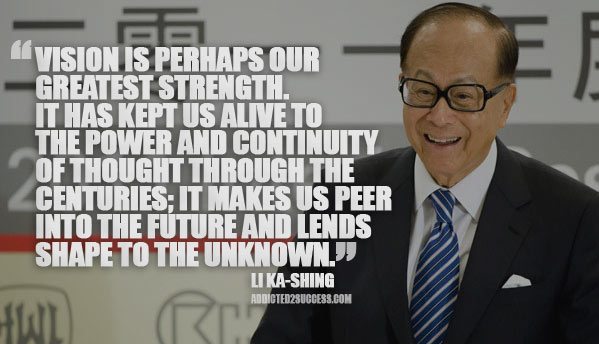Success Advice
Asia’s Richest Man “Li Ka-Shing” Shares Advice For Young Entrepreneurs
Asia’s richest man Li Ka-Shing with a net worth of $31.9 Billion teaches you how to buy a car and house within five years.
“Suppose your monthly income is only 2,000 RMB, you can live well. I can help you put money into five sets of funds. The first $600, second $400, third $300, fourth $200, fifth $500.”
First set of funds:
The first set of funds is used for living expenses. It’s a simple way of living and you can only
be assigned to less than twenty dollars a day.
- A daily breakfast of vermicelli, an egg and a cup of milk.
- For lunch just have a simple set lunch, a snack and a fruit.
- For dinner go to your kitchen and cook your own meals that consist of two vegetables dishes and a glass of milk before bedtime.
For one month the food cost is probably $500-$600. When you are young, the body will not have too many problems for a few years with this way of living.
Second set of funds:
To make friends, expand your interpersonal circle. This will make you well off. Your phone bills can be budgeted at 100 RMB. You can buy your friends 2 lunches a month, each at $150.
Who should you buy lunch for? Always remember to buy lunch for people who are more knowledgeable than you, richer than you or people who has helped you in your career. Make sure you do that every month. After one year, your circle of friends should have generated tremendous value for you. Your reputation, influence, added value will be clearly recognized. You’ll also enhance your image of being good and generous.
Third set of funds:
To learn. Monthly spend about 50-100 RMB to buy books. Because you don’t have a lot of money, you should pay attention to learning. When you buy the books, read them carefully and learn the lessons and strategies that is being taught in the book.
Each book, after reading them, put them into your own language to tell the stories. Sharing with others can improve your credibility and enhance the affinity. Also save up $ 200 per month to attend a training course. When you have higher income or additional savings, try to participate in more advanced training. When you participate in good training, not only do you learn good knowledge, you also get to meet like-minded friends who are not easy to come by.
Fourth set of funds:
Use it for holidays overseas. Reward yourself by traveling at least once a year. Continue to grow from the experience of life. Stay in youth hostels to save cost. In a few years you would have travelled to many countries and have different experiences. Use that experience to recharge yourself so that you’ll continually have passion in your work.
Fifth set of fund:
Invest. Save the $500 in your bank and grow it as your initial startup capital. The capital can then be used to do a small business. Small business is safe. Go to wholesalers and look for products to sell. Even if you lose money, you will not lose too much money. However, when you start earning money, it will boost your confidence and courage and have a whole new learning experience on running a small business.
Earn more and you can then begin to buy long-term investment plans and get long-term security on your
financial wealth being of yourself and your families. So that no matter what happens, there will be adequate funds and the quality of life will not decline.
Well, after struggling for a year and if your second year salary is still 2,000 RMB then that means you have not grown as a person. You should be really ashamed of yourself. Do yourself a favor and go to the supermarket and buy the hardest tofu. Take it and smash it on your head because you deserve that.
If your monthly income is at 3,000 RMB, you must still work very hard. You must try to find a part time job. It will be great to find part time sales jobs. Doing sales is challenging but it is the fastest way for you to acquire the art of selling and this is a very deep skill that you will be able to carry it for the rest of your career.
All successful entrepreneurs are good sales people. They have the ability to sell their dream and visions. You’ll also meet many people that will be of value to you in the later part of your career. Once you’re in sales, you will also learn what sells and what not.
Use the sensitivity of detecting market sentiments as a platform for running your business and in the identification of product winners in the future.
Try to buy minimal clothes and shoes. You can buy them all you want when you’re rich. Save your money and buy some gifts for your loved ones and tell them your plans and your financial goals. Tell them why you are so thrifty. Tell them your efforts, direction and your dreams.
Businessmen everywhere need help. Offer yourself to do part time for any kind of opportunities. This will help to hone your will and improve your skills. You will start to develop eloquence and soon, you’ll be closer to your financial goals.
By the second year, your income should be increased to at least 5,000 RMB. Minimum it should be 3,000 RMB. Otherwise you would not be able to keep up with inflation.

Conclusion
No matter how much you earn, always remember to divide it into five parts proportionately. Always make yourself useful. Increase your investment in networking. When you increase your social investment, expand your network of contacts, your income also grows proportionately. Increase your investment in learning, strengthen your self-confidence, increase investment in holidays, expand your horizons and increase investment in the future and that will ultimately increase your income.
Maintain this balance and gradually you will begin to have a lot of surplus. This is a virtuous circle of life plans. Your body will start to get better and better as you get more nutrition and care.
Friends will be aplenty and you will start to make more valuable connections at the same time. You will then have the conditions to participate in very high-end training and eventually you’ll be exposed to bigger projects, bigger opportunities. Soon, you will be able to gradually realize your various dreams, the need to buy your own house, car, and to prepare an adequate education fund for your child’s future.
Life can be designed. Career can be planned. Happiness can be prepared. You should start planning now. When you are poor, spend less time at home and more time outside. When you are rich, stay at home more and less outside. This is the art of living. When you are poor, spend money on others. When you’re rich, spend money on yourself. Many people are doing the opposite.
When you are poor, be good to others. Don’t be calculative. When you are rich, you must learn to let others be good to you. You have to learn to be good to yourself better. When you are poor, you have to throw yourself out in the open and let people make good use of you. When you are rich, you have to conserve yourself well and don’t let people easily make use of you. These are the intricate ways of life that many people don’t understand.
When you are poor, spend money so that people can see it. When you are rich, do not show off. Just silently spend the money on yourself. When you are poor, you must be generous. When you are rich, you must not be seen as a spendthrift. Your life would have come full circle and reach it’s basics. There is tranquility at this stage.
There is nothing wrong with being young. You do not need to be afraid of being poor. You need to know how to invest in yourself and increase your wisdom and stature. You need to know what is important in life and what is worth investing in. You also need to know what you should avoid and not spend your money on. This is the essence of discipline. Try to avoid spending money on clothing but buy a selective number of items that has class. Try to eat less outside. If you were to eat outside, do make sure you buy lunches or dinners and foot the bill. When buying people dinner, make sure you buy dinners for people who have
bigger dreams than you and works harder than you.
Once your livelihood is no longer an issue, use the remainder of your money to pursue your dreams. Spread your wings and dare to dream! Make sure you live an extraordinary life!
English Translation by: Edmund Ng (CeoConnectz) Thanks Ed!
There are many people who are struggling to make ends meet. It doesn’t matter if they are rich or they are poor. There are lessons for all to learn from Li Ka Shing.
Business
The Simple Security Stack Every Online Business Needs
Most small businesses are exposed online without realising it. This simple protection stack keeps costs low and risks lower.

Running a business online brings speed and reach, but it also brings risk. Data moves fast. Payments travel across borders. Teams log in from homes, cafés, and airports. (more…)
Business
If Your Business Internet Keeps Letting You Down, Read This
From smoother operations to better security, dedicated internet access is quietly powering today’s high-performing businesses.

Today, a dependable internet service is the bedrock for uninterrupted business operations. Many organizations rely on stable online connections for communication, data transfer, and customer interaction. (more…)
Did You Know
How Skilled Migrants Are Building Successful Careers After Moving Countries
Behind every successful skilled migrant career is a mix of resilience, strategy, and navigating systems built for locals.

Moving to a new country for work is exciting, but it can also be unnerving. Skilled migrants leave behind familiar systems, networks, and support to pursue better job opportunities and a better future for their families. (more…)
-

 News2 weeks ago
News2 weeks agoBrandon Willington Builds 7-Figure Business by Ignoring Almost Everything
-

 Health & Fitness3 weeks ago
Health & Fitness3 weeks agoWhat Minimalism Actually Means for Your Wellness Choices
-

 Did You Know2 weeks ago
Did You Know2 weeks agoWhy Most Online Courses Fail and How to Fix Them
-

 Business3 weeks ago
Business3 weeks agoIf Your Business Internet Keeps Letting You Down, Read This
-

 Business1 week ago
Business1 week agoEntrepreneur’s Guide to Pay Stubs: Why Freelancers and Small Business Owners Need a Smart Generator
-

 Business6 days ago
Business6 days agoThe Simple Security Stack Every Online Business Needs
-

 Scale Your Business5 days ago
Scale Your Business5 days ago5 Real Ways to Grow Your User Base Fast
-

 Business4 days ago
Business4 days agoThe Salary Shift Giving UK Employers An Unexpected Edge


























29 Comments